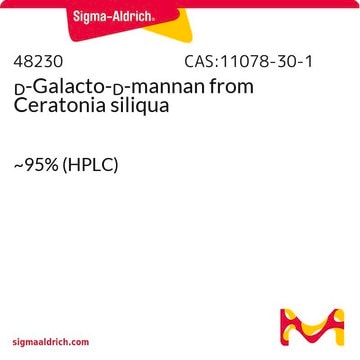G0753
Locust bean gum from Ceratonia siliqua seeds
Sinónimos:
Galactomannan polysaccharide, Gum, locust bean, Manno-galactan (main component)
Iniciar sesiónpara Ver la Fijación de precios por contrato y de la organización
About This Item
Productos recomendados
biological source
Ceratonia siliqua seeds
form
powder
color
beige
storage temp.
room temp
Application
Locust bean gum (LBG, galactomannan polysaccharide) from Ceratonia siliqua seeds may be used as a substrate to help identify, differentiate and characterize mannanase(s), such as the β-Mannanases (EC 3.2.1.78). LBG may be used in the development of drug delivery devices. LBG may be used to study its properties as a protective agent on both eucalyptus and microcrystalline cellulose destruction of crystallinity by ball milling. LBG may be used to study its properties as a food additive that reduces spoilage caused by Aspergillus flavus. LBG may be used as a starting material for the organic synthesis of hyperbranched N-glycan core structures.
Other Notes
Believed to be a straight chain polymer of mannose with one galactose branch on every fourth mannose and a M.W. of approx. 310 kDa.
To gain a comprehensive understanding of our extensive range of Oligosaccharides for your research, we encourage you to visit our Carbohydrates Category page.
Storage Class
11 - Combustible Solids
wgk_germany
WGK 2
flash_point_f
Not applicable
flash_point_c
Not applicable
ppe
Eyeshields, Gloves, type N95 (US)
Certificados de análisis (COA)
Busque Certificados de análisis (COA) introduciendo el número de lote del producto. Los números de lote se encuentran en la etiqueta del producto después de las palabras «Lot» o «Batch»
¿Ya tiene este producto?
Encuentre la documentación para los productos que ha comprado recientemente en la Biblioteca de documentos.
Los clientes también vieron
Camila P Favaro et al.
Biomolecules, 10(2) (2020-02-09)
Soluble coffee offers the combined benefits of high added value and practicality for its consumers. The hydrolysis of coffee polysaccharides by the biochemical route, using enzymes, is an eco-friendly and sustainable way to improve the quality of this product, while
S Sánchez-Segado et al.
Bioresource technology, 104, 324-328 (2011-11-22)
A process for the production of ethanol from carob (Ceratonia siliqua) pods was designed and an economic analysis was carried out for a hypothetical plant. The plant was assumed to perform an aqueous extraction of sugars from the pods followed
B M Smith et al.
Journal of food science, 77(6), C684-C689 (2012-06-08)
Carob germ proteins have been shown to have functional properties similar to wheat gluten enabling formulation and production of yeast leavened gluten-free baked goods from a true dough rather than a stiff batter. The purpose of this research was to
Hossein Vaheed et al.
Journal of industrial microbiology & biotechnology, 38(1), 101-111 (2010-09-08)
In this research, ethanol production from carob pod extract (extract) using Zymomonas mobilis with medium optimized by Plackett-Burman (P-B) and response surface methodologies (RSM) was studied. Z. mobilis was recognized as useful for ethanol production from carob pod extract. The
T Mohammadi Moghaddam et al.
Journal of the science of food and agriculture, 91(6), 1083-1088 (2011-02-11)
Lallemantia royleana (Balangu) is a mucilaginous endemic plant which is grown in different regions of world. The flow behaviour of Balangu seed extract (BSE) and its mixture with xanthan, guar and locust bean gums at 1:3, 1:1 and 3:1 ratios
Nuestro equipo de científicos tiene experiencia en todas las áreas de investigación: Ciencias de la vida, Ciencia de los materiales, Síntesis química, Cromatografía, Analítica y muchas otras.
Póngase en contacto con el Servicio técnico









